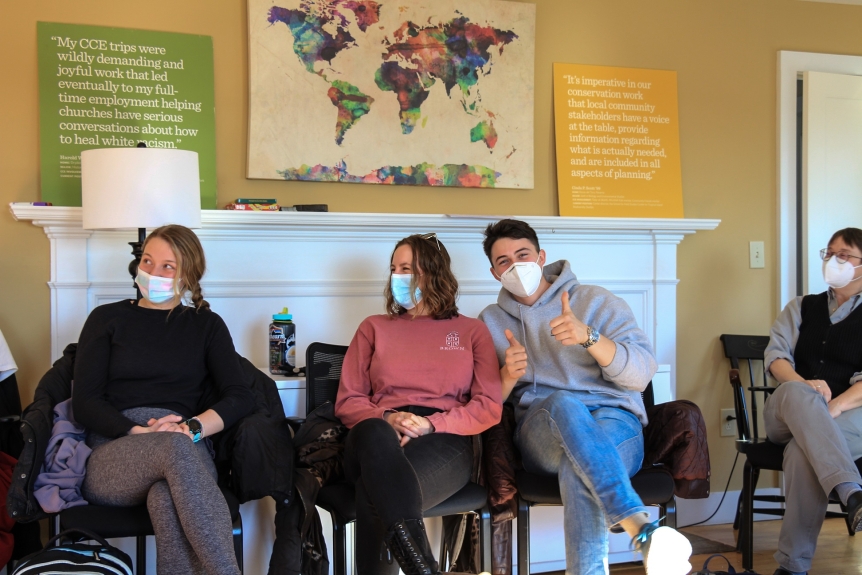Project Assistant Program

This program is paused due to reduced staffing. If you have interest for a future Project Assistant, please contact Claire Tebbs (ctebbs@middlebury.edu).
We train, support, and fund Project Assistants (PAs) to provide instructional and logistical support for students executing community-based projects developed by faculty and community partners.
How It Works
Community-connected project-based learning requires additional support for community partnership relationships and logistics, in addition to an awareness of best practices for working with diverse others. The positive learning potentials of community-connected learning (CCL) require highly collaborative leadership by those in instructional roles, reflective processes for students that allow for meaning-making and connections to other learning experiences and knowledge of social structures, and the support of students’ development of civic leadership skills.
Each semester, the CCE trains and supports a cohort of Project Assistants (PAs) to support faculty incorporating community-connected work in their courses. PAs work with faculty members to provide instructional and logistical support for students executing community-based projects.
If you are interested in participating in this program find out more by contacting a member of the PA team.
Benefits to Students
Trained PAs allow more Middlebury College students to experience the impactful pedagogy of community-connected learning. PAs help provide instructional and logistical support for the students executing projects developed by faculty and community partners.
Benefits to Faculty
Trained PAs expand the feasibility and sustainability of CCL for faculty. We view this Project Assistant Program as a strategy for CCL expansion and success. The availability of trained and supported PAs will enable more faculty to implement CCL effectively and sustainably.
Application
Faculty who are interested in having PA support for their course need to submit an application. Applications open towards the end of the semester prior to the semester for which you are requesting a PA.
Project-Based Learning (PBL)
The CCE is a partner in campus efforts to support Project-Based Learning (PBL) as a high-impact pedagogy. We have an ongoing collaboration with the Center for Teaching, Learning, and Research to train a cohort of Project-Based Learning (PBL) Project Assistants that allow faculty to obtain this needed support for projects with external community-partnerships including public products, a core component of all PBL courses.
For more Middlebury College-specific resources for faculty, visit the Center for Teaching, Learning, and Research.
FAQs
What is the role of the PA, and how many hours will they be available each week?
PAs have six hours/week to support a course (assuming standard spring term).
Each course will have a customized PA job description that the faculty member will propose during the application process requesting a PA and then refine through conversations with their PA.
How often are faculty members expected to meet with their PAs?
Timing and frequency of meetings with your PA during term will be mutually determined at the beginning of the term (usually once per week).
What training do PAs receive to support this work, and when does training take place?
All PAs will be trained in six foundational areas:
- Goals and Principles of PBL
- Relationship-building (between PAs and faculty, with community partners, etc.)
- Team Building
- Project Management
- Liberal Arts Skills for the Public Good
- Navigating the Institution (i.e. who can help PAs support your students in their project work)
More specialized training sessions follow, depending upon the needs of the instructor and the project they are envisioning. PAs would, in consultation with their faculty member, choose these more customized training sessions to suit the particular project being developed. Each faculty member would complete a faculty inventory in advance, so that the training team could determine which special sessions would be needed.
The training program for student Project Assistants supporting faculty in leading CCL courses takes place in the first month of the semester.
Faculty accepted to participate in the PA program commit to 1) one cohort meeting with CCE staff and PAs in advance of the semester, 2) share a draft syllabus with CCE staff a month before the semester begins and 3) two training meetings with your PA prior to the start of the course.
What are some specific examples of skills, competencies, and objectives covered in the PA training that they will be able to bring to assist me in my course?
Here are some examples of some of the learning objectives, competencies and themes our training modules will cover:
- Developing shared expectations
- Implementing community partnership best practices
- What is reciprocity and what does it look like in practice?
- Developing shared understanding of commitments between and among students and community partners
- Contributing to clear, reliable communication
- Bringing awareness of power dynamics across different groups
- Discussing key dispositions of community-engaged learners: open-mindedness, cultural humility , appreciation of community cultural wealth, curiosity, empathy, commitment
- Supporting team development within student and community groups
- Identifying goals, challenges, and strategies for collaborative work
- Holding the question: “What is ‘adequate understanding’ of the communities with which one is working”?
- Assigning group roles based on individual strengths and learning goals
- Addressing problem solving and conflicts productively
- Consistently communicating about group dynamics
- Managing logistics of projects using effective project management tools
- Developing shared work plan, timeline, and accountability systems
- Supporting transportation, risk management, and funding
- Supporting sharing of deliverables (in person, electronically, etc.)
- Creating reflective spaces for meaning-making
- Leading discussions connecting learning and experiences
- Responding to written critical analyses/reflections
- Leading online asynchronous and synchronous reflections (if needed)
What are some examples of the kinds of work and facilitation PAs could do in my course?
Examples of the type of work and facilitation a PA could lead include:
- Provide an introductory overview of the principles of PBL to course participants
- Facilitate team selection and team building with project groups
- Lead project group discussions about power dynamics
- Introduce and maintain project management tools
- Manage community partner communication tools with project groups
- Manage logistics of transportation if the project site requires
- Implement proper risk management procedures needed for community partnership work (in consultation with CCE)
- Contribute feedback on student work (written reflections, peer- and self-assessments, community partner deliverables, final presentation)
- Read more about past PA project experiences here.
Connect with us!
Claire Tebbs
Program Director
- Email:
- ctebbs@middlebury.edu
- Tel:
- (802) 443-4238
- Office:
- 26 Blinn Lane


